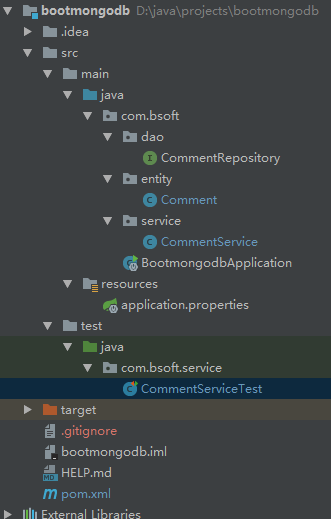先大体了解下项目结构:

1.pom引入mongodb依赖
<dependency> <groupId>org.springframework.boot</groupId> <artifactId>spring-boot-starter-data-mongodb</artifactId> </dependency>
2 配置文件,application.properties文件
#spring.data.mongodb.host=127.0.0.1 #spring.data.mongodb.port=27017 #spring.data.mongodb.database=books ###这种类似于关系型数据库url配置 spring.data.mongodb.uri=mongodb://127.0.0.1:27017/books
3.建立mongdb文档映射实体类
@Document(collection = "comment") //如果省略,默认类名小写
//复合索引
//@CompoundIndex(def="{'userId':1},{'nickName':-1}")
public class Comment implements Serializable {
@Id //对应comment中的_id
private String id;
@Field("content")//属性对应mongodb字段名,如果一致,无须该注解
private String content;//吐槽内容
private String articleId;//文章id
private Date publishTime;//发布日期
@Indexed //添加一个单字段的索引
private String userId;//发布人id
private String nickName;//发布人昵称
private Date createDateTime;//评论的日期时间
private Integer likeNum;//点赞数
private Integer replyNum;//回复数
private String state;//状态
private String parentId;//上级id
....................
}
SpringBoot中MongoDB常用注解如下:
@Document
标注在实体类上,把一个java类声明为mongodb的文档,可以通过collection参数指定这个类对应的文档。类似于hibernate的entity注解,标明由mongo来维护该表。
@id
主键,不可重复,自带索引,可以在定义的列名上标注,需要自己生成并维护不重复的约束。如果自己不设置@Id主键,mongo会自动生成一个唯一主键,并且插入时效率远高于自己设置主键。
在实际业务中不建议自己设置主键,应交给mongo自己生成,自己可以设置一个业务id,如int型字段,用自己设置的业务id来维护相关联的表。
@Indexed
声明该字段需要加索引,加索引后以该字段为条件检索将大大提高速度。
唯一索引的话是@Indexed(unique = true)。
也可以对数组进行索引,如果被索引的列是数组时,MongoDB会索引这个数组中的每一个元素。
也可以对整个Document进行索引,排序是预定义的按插入BSON数据的先后升序排列。
@CompoundIndex
复合索引,加复合索引后通过复合索引字段查询将大大提高速度。
@Field
属性对应mongodb字段名,如果一致,无须该注解
4.service业务层
CommonService,操作mongo的具体业务类
采用了Repository和MongoTemplate两种方式来实现的,其中Repository 提供了最基本的数据访问功能,其几个子接口则扩展了一些功能。
MongoTemplate核心操作类:Criteria和Query
-
Criteria类:封装所有的语句,以方法的形式查询。
-
Query类:将语句进行封装或者添加排序之类的操作。
@Service
public class CommentService {
@Autowired
private CommentRepository commentRepository;
@Autowired
private MongoTemplate mongoTemplate;
/**
* 保存一个评论
* @param comment
*/
public void saveComment(Comment comment){
commentRepository.save(comment);
// mongoTemplate.save(comment);
// mongoTemplate.insert(comment);
}
/**
* 批量保存评论
* @param <
*/
public void mutilSaveComment(List<Comment> list){
commentRepository.saveAll(list);
// mongoTemplate.insertAll(list);
}
/**
* 更新一个评论
* @param comment
*/
public void updateComment(Comment comment){
commentRepository.save(comment);
}
/**
* 查询全部评论
* @return
*/
public List<Comment> findCommentAll(){
// return commentRepository.findAll();
return mongoTemplate.findAll(Comment.class);
}
/**
* 条件查询
* @return
*/
public List<Comment> findCommentByContion(Query query){
return mongoTemplate.find(query,Comment.class);
}
/**
* 查询全部评论通过id排序
* @return
*/
public List<Comment> findCommentAllOrder(){
// return commentRepository.findAll(Sort.by(Sort.Order.desc("_id")));
Query query=new Query();
query.with(Sort.by(Sort.Direction.DESC,"id"));
return mongoTemplate.find(query,Comment.class);
}
/**
* 通过id查询评论
* @return
*/
public Comment findCommentById(String id){
//return commentRepository.findById(id).get();
return mongoTemplate.findById(id,Comment.class);
}
/**
* 通过父id分页查询
* @param parentId
* @param page
* @param size
* @return
*/
public Page<Comment> findByparentIdPage1(String parentId, int page,int size){
return commentRepository.findByParentId(parentId, PageRequest.of(page-1,size));
}
public List<Comment> findByparentIdPage2(String parentId, int page,int size){
Query query=Query.query(Criteria.where("parentId").is(parentId));
query.with(PageRequest.of(page-1,size));
return mongoTemplate.find(query,Comment.class);
}
/**
* 通过id删除
* @param id
*/
public void deleteById(String id){
// commentRepository.deleteById(id);
Comment comment=new Comment();
comment.setId(id);
mongoTemplate.remove(comment);
}
/**
* 删除全部数据
* @param
*/
public void deleteAll(){
commentRepository.deleteAll();
}
/**
* 批量删除
* @param
*/
public void deleteMulti(List<Comment> list){
commentRepository.deleteAll(list);
}
/**
* 点赞数加一
* @param id
*/
public void updateCommentLikeNumm(String id){
//点赞数加一 效率低,增加id开销
// Comment comment=commentRepository.findById(id).get();
// comment.setLikeNum(comment.getLikeNum()+1);
// commentRepository.save(comment);
//查询对象
Query query=Query.query(Criteria.where("_id").is(id));
//更新对象
Update update=new Update();
//局部更新 相当于$set
// update.set(key,value);
//递增$inc
//update.inc("likeNum",1);
update.inc("likeNum");
//查询对象 更新对象 集合的名称或实体类的类型Comment.class
mongoTemplate.updateFirst(query,update,"comment");
}
/**
* 统计
* @return
*/
public Long commentCount(Query query){
return mongoTemplate.count(query,Comment.class);
}
}
5.dao层
dao层CommentRepository 继承MongoRepository,MongoRepository中已经预定义了一些增删查的方法,根据JPA的命名规范可以定义一些查询方法,不需要具体实现,底层会帮你实现。
public interface CommentRepository extends MongoRepository<Comment,String> {
//新增按父id分页查询
Page<Comment> findByParentId(String parentId,Pageable pageable);
}
6.测试
测试类如下:
@RunWith(SpringRunner.class)
@SpringBootTest
public class CommentServiceTest {
@Autowired
private CommentService commentService;
/**
* 新增单个评论
*/
@Test
public void saveCommentTest(){
Comment comment=new Comment();
//comment.setId("2");
comment.setArticleId("777");
comment.setContent("添加数据测试");
comment.setPublishTime(new Date());
comment.setUserId("1001");
comment.setNickName("张三");
comment.setCreateDateTime(new Date());
comment.setLikeNum(1);
comment.setReplyNum(0);
comment.setState("1");
comment.setParentId("0");
commentService.saveComment(comment);
}
/**
* 批量新增
*/
@Test
public void mutilSaveComment(){
List<Comment> list=new ArrayList<>();
Comment comment;
for(int i=1;i<=10;i++){
comment=new Comment();
comment.setId(""+i);
comment.setArticleId(""+i);
comment.setContent("添加数据测试"+i);
comment.setPublishTime(new Date());
comment.setUserId("1001");
comment.setNickName("张三");
comment.setCreateDateTime(new Date());
comment.setLikeNum(0);
comment.setReplyNum(0);
comment.setState("1");
comment.setParentId("0");
list.add(comment);
}
commentService.mutilSaveComment(list);
}
/**
* 查询全部
*/
@Test
public void findCommentListTest() {
List<Comment> list=commentService.findCommentAll();
for(Comment comment:list){
System.out.println(comment);
}
}
/**
* 通过id排序
*/
@Test
public void findCommentListOrderTest() {
List<Comment> list=commentService.findCommentAllOrder();
for(Comment comment:list){
System.out.println(comment);
}
}
/**
* 通过id删除
*/
@Test
public void findCommentById() {
Comment comment=commentService.findCommentById("1");
System.out.println(comment);
}
/**
* 通过父id分页查询1
*/
@Test
public void findByParentId(){
Page<Comment> page=commentService.findByparentIdPage1("0",1,10);
System.out.println(page.getTotalElements());
System.out.println(page.getContent());
}
/**
* 通过父id分页查询2
*/
@Test
public void findByparentIdPage2(){
List<Comment> list=commentService.findByparentIdPage2("0",1,10);
for(Comment comment1:list){
System.out.println(comment1);
}
}
/**
* 通过id删除评论
*/
@Test
public void deleteById(){
commentService.deleteById("1");
}
/**
* 删除全部
*/
@Test
public void deleteAll(){
commentService.deleteAll();
}
/**
* 批量删除
*/
@Test
public void deleteMulti(){
List<Comment> list=new ArrayList<>();
Comment comment;
for(int i=1;i<=10;i++) {
comment = new Comment();
comment.setId("" + i);
list.add(comment);
}
commentService.deleteMulti(list);
}
/**
* 多条件查询in
*/
@Test
public void findCommentByContion(){
List<String> list=new ArrayList<>();
list.add("1");
list.add("2");
list.add("3");
//查询对象
Query query=Query.query(Criteria.where("_id").in(list));
List<Comment> list2=commentService.findCommentByContion(query);
for(Comment comment1:list2){
System.out.println(comment1);
}
}
/**
* 多条件查询大于小于等于
*/
@Test
public void findCommentContionByGtLt(){
//查询对象
Query query=Query.query(Criteria.where("likeNum").gte(2).lte(6));
List<Comment> list =commentService.findCommentByContion(query);
for(Comment comment1:list){
System.out.println(comment1);
}
}
/**
* 多条件查询and
*/
@Test
public void findCommentContionByAnd(){
//查询对象
Query query=Query.query(new Criteria().andOperator(Criteria.where("likeNum").gte(2),Criteria.where("state").is("1")));
List<Comment> list =commentService.findCommentByContion(query);
for(Comment comment1:list){
System.out.println(comment1);
}
}
/**
* 多条件查询or
*/
@Test
public void findCommentContionByOr(){
//查询对象
Query query=Query.query(new Criteria().orOperator(Criteria.where("likeNum").gte(2),Criteria.where("state").is("0")));
List<Comment> list =commentService.findCommentByContion(query);
for(Comment comment1:list){
System.out.println(comment1);
}
}
/**
* 更新 点赞数加一
*/
@Test
public void updateCommentLikeNumm(){
commentService.updateCommentLikeNumm("1");
}
/**
* 统计查询
*/
@Test
public void commentCount(){
Query query=Query.query(Criteria.where("likeNum").gte(2));
Query query1=new Query();
Long count1=commentService.commentCount(query);
Long count2=commentService.commentCount(query1);
System.out.println("点赞数大于等于2的文档有======="+count1);
System.out.println("统计总数======="+count2);
}
}
到此为止,我们已经在SpringBoot项目中引入了MongoDB,通过MongoRepository和MongoTemplate两种方式来实现了基本的增删改查操。